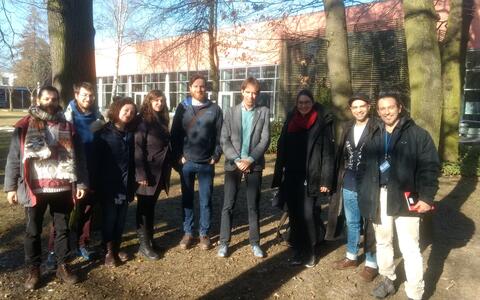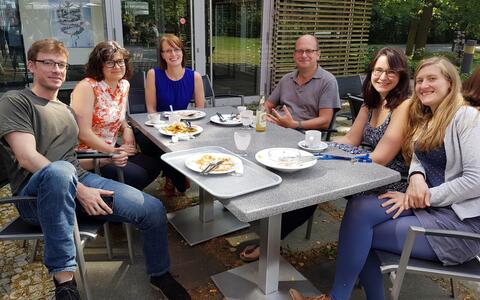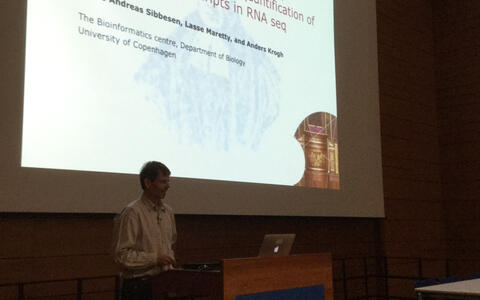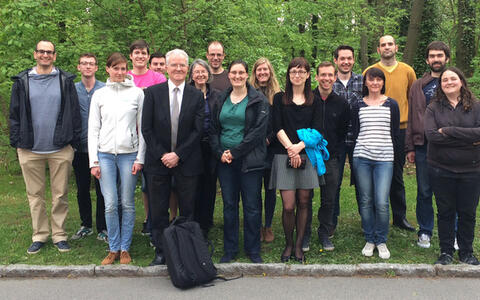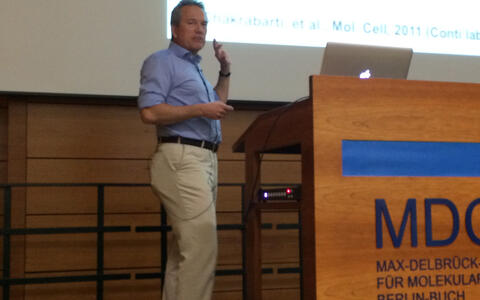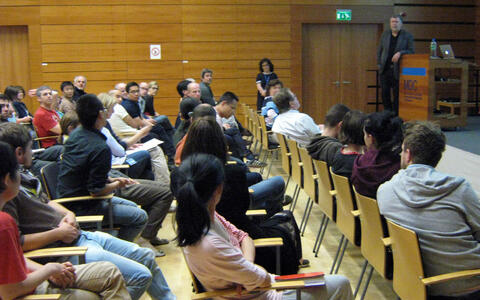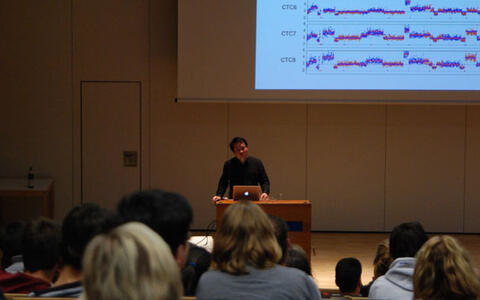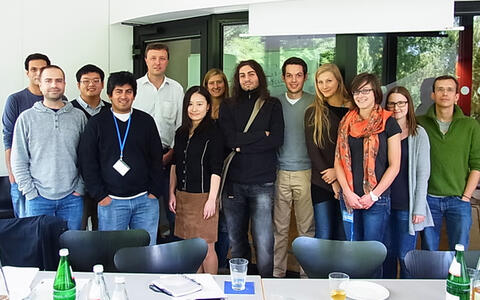
Distinguished Speakers
Past Events
- 14.02.2017 | Alexander van Oudenaarden | Hubrecht Institute, Utrecht
- 06.12.2016 | Wolf Reik | Babraham Institute, Cambridge
- 01.09.2016 | Oliver Hobert | Columbia University New York
- 26.05.2015 | Anders Krogh | University of Copenhagen
- 05.05.2015 | Eric Westhof | IBMC/CNRS Strasbourg
- 21.04.2015 | Matthias Hentze | EMBL Heidelberg
- 01.07.2014 | Hans R. Schoeler | MPI Muenster
- 04.06.2014 | Xiaoliang Sunney Xie | Harvard University, Cambridge
- 17.09.2013 | Patrick Cramer | Gene Center Munich | LMU
- 20.06.2013 | Michael Levine | University of California, Berkeley
Visits of Distinguished Speakers
Alexander van Oudenaarden
On February 14, 2017, we had the pleasure to host Alexander van Oudenaarden, director of the Hubrecht Institute in Utrecht, as a distinguished speaker in our seminar series. Alexander is a world-leader in systems biology of single cells. At the Berlin Institute of Medical Systems Biology he spoke about systematic approaches to identify novel cell types and about emerging methods for determining cell-cell interactions and lineage history by single cell sequencing.
In addition to meetings with individual group leaders and discussions with PhD students and postdocs over lunch and dinner, Alexander also gave the closing lecture of our lecture series on single cell technologies on February 15.
Oliver Hobert
On September 1, 2016, the Howard Hughes Medical Institute (HHMI) Investigator Oliver Hobert talked about the regulatory map of the C. elegans nervous system. His research group at the Columbia University in New York dissected how general and characteristic features of neurons are specified through distinct cis-regulatory promoter elements of neuronal genes.
MDC graduate students took the chance to meet Oliver during the student lunch for discussing their science and getting first-hand insight into the career of this renowned researcher.
Anders Krogh
On May 26, 2015, Anders Krogh from the University of Copenhagen, presented a Distinguished Speaker Seminar on how “Bayesian transcriptome assembly improves detection and quantification of alternative transcripts in RNAseq”.
Anders, a theoretical physicist by training, is a pioneer in bioinformatics, having introduced the use of hidden Markov models to protein and nucleic acid sequence analysis. He is also well known to students for having co-authored a standard textbook in bioinformatics. Recently, he focussed on analysis of data from high-throughput DNA sequencing with applications in post-transcriptional regulation, ancient genomics, metagenomics, and transcriptome analysis.
Eric, who directs the well known RNA focused institute IBMC in Strasbourg, is famous for his pioneering work to predict and model the structure of RNA. His lectures sparked inspiring discussions, and several students and postdocs enjoyed lunch discussions with him. Thanks Eric for the great visit!
Matthias Hentze
On the April 21, 2015, we had another highlight in our seminar series as Matthias Hentze, Director at the EMBL Heidelberg and Head of our Scientific Advisory Board, gave a Distinguished Speaker Seminar about “RNA binding proteins, metabolism and a new function of the genome”.
Matthias combines biochemical and systems level approaches to investigate the regulation of mRNAs via RNA-binding proteins and non-coding regulatory RNAs and recently identified all RNA-bindinding proteins in vivo using RNA interactome capture. As some of these RNA-binding proteins are ‘classic' enzymes carrying out housekeeping functions of intermediary metabolism, Matthias proposed the existence of post-transcriptional regulatory networks between intermediary metabolism and gene expression based on RNA, enzyme and metabolite interactions.
Hans Schoeler
On the July 1 and 2, 2014, the Berlin Institute for Medical Systems Biology had the pleasure to host Hans Schoeler from the MPI for Molecular Biomedicine in Muenster.
Hans is a pioneer in the field of stem cell research and his name is closely linked to one of the main factors that enables these cells to form every possible cell type of the body: the gene regulating protein Oct4. Hans was one of the first to discover its role in mouse embryonic stem (ES) cells and later used it to show that ES cells are totipotent and able to form even oocytes. As a distinguished speaker in the Systems Biology Seminar Series, he presented his recent work on deciphering the molecular mechanisms underlying Oct4’s function in stem cells and the mammalian germ line. In a second lecture, which was part of the Systems Biology Lecture Series “Stem Cells” that aims to provide in-depth education of PhD students interested in this topic, he explained how factors like Oct4 can be used to reprogram normal body cells into multi- or pluripotent stem cells. The hope is to exploit such a process for regenerative medicine.
Both lectures were very well received by scientists from the MDC campus and all over Berlin. Thank you, Hans, for this stimulating visit!
Sunney Xie
Sunney Xie from Harvard University gave a very well received talk as a distinguished speaker in the Systems Biology (BIMSB) Seminar Series on the June 4, 2014.
During the talk, Sunney presented his recent work in the emerging field of single cell genomics, demonstrating how the new technology will not only help to advance our understanding in basic science, but also lead to novel clinical applications.
Patrick Cramer
Patrick Cramer from the Gene Center Munich gave a very well attended talk as a distinguished speaker in the Systems Biology (BIMSB) Seminar Series on the September 19, 2013.
Apart from discussions with group leaders, he also met some of our students and postdocs and discussed with them during lunch, fueled by some sandwiches. Discussions were lively and spirits were high. Thanks Patrick!
As part of BIMSB's new seminar series that aims to bring distinguished scientists from all over the world to Berlin, Michael S. Levine, Professor of Molecular and Cell Biology at UC Berkeley visited our campus on the June 19 and 20, 2013 to deliver two well-received lectures and to meet with BIMSB and MDC faculty.
BIMSB was very happy to host Mike Levine, one of the most-renowned developmental biologists of our time. Mike is probably most famous for the discovery of the homeobox in 1984 together with William McGinnis and Ernst Hafen, as well as for his pioneering enhancer studies in the even-skipped locus in Drosophila melanogaster. Over the years, his lab has focused on understanding how transcription is regulated and drives development by employing cutting-edge technologies such as transcriptomics, genomics, and mathematical modeling.
On the 19th, Mike gave a lecture in the series Systems Biology Lectures in Development at the Charitè campus in Berlin-Mitte to a crowd of mostly students from all over Berlin. The lecture titled "Mechanisms of transcriptional precision and timing in the Drosophila embryo" illustrated recent work in his lab on how transcriptional regulatory elements can work combinatorially to yield coherent and robust gene expression across a cell population, and how pausing of polymerase at promoters can be a means of achieving a more synchronous onset of transcription – features that are both crucial for proper embryonic development.
On the 20th, Mike held the BIMSB Distinguished Speaker Seminar on our campus in Berlin-Buch. Titled "Evolutionary origins of the vertebrate neural crest and new mouth in the Ciona tadpole", the lecture focused on Evo-Devo analyses of the origins and transcriptional underpinnings of heart development in Ciona intestinalis, a marine chordate and among the closest non-vertebrate relatives to modern vertebrates. Furthermore, Mike speculated that two pigmented sensory cells within the Ciona tadpole, the otolith and the ocellus, could be the orthologous 'rudiments' to the neural crest – a key innovation in vertebrates.

